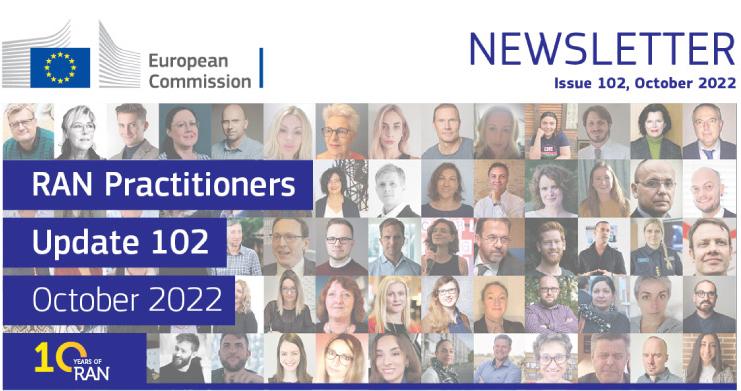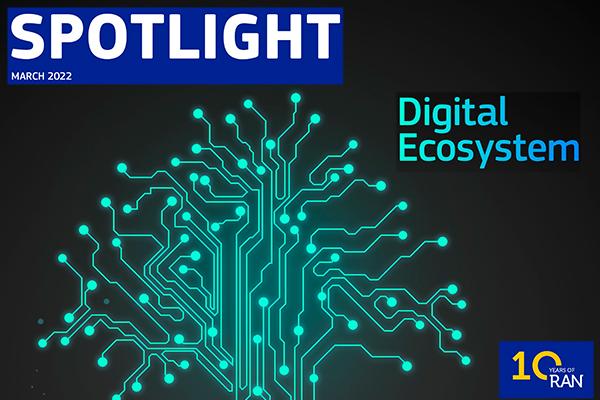
Online radicalisation is becoming an ever-growing challenge for EU Member States, as recent events have shown. Violent extremist organisations continue to adopt and adapt to new digital technologies to radicalise and recruit. As a result, they are increasingly adept at using the internet and social media to target young people on various platforms and channels online. Through various Working Group meetings, webinars and events, this topic has been in sharp focus for RAN Practitioners this year. In this issue of the Update, we take a look at the online radicalisation challenge, through a new film, the latest episode of RAN Reporters, a recently-published paper and an upcoming event.
A new film produced by RAN Practitioners explores some of the technological advancements which we will see in the coming months and years. The film, which hears from a number of experts from the tech sector, seeks to explain the metaverse and its various elements. It examines the challenges and opportunities the 3rd model of the internet presents for violent extremists, young people and practitioners alike.
The latest episode of RAN Reporters visits the Centre for the Study of Democracy (CSD) who have been delivering a project – funded by the Civil Society Empowerment Programme (CSEP) – aimed at confronting violent extremist messages and ideas propagated online. The programme follows the members of ‘YouthRightOn’, as they meet with likeminded organisations in Bulgaria to plan the next phase of the project’s activity.
A RAN Practitioners ‘Spotlight’ magazine, published in March 2022, takes a look at today’s digital ecosystem, and its effect on the ability of violent extremists to radicalise and recruit. The publication looks at the digital grooming tactics deployed by violent extremists, the role of technology in P/CVE, and the need to improve digital literacy skills and resilience to disinformation and conspiracy narratives.

Event
RAN Practitioners organised a cross-cutting event on 27th September in Berlin, that provided the opportunity to discuss and learn more about the online dynamics of violent extremism in daily practice, research, and policy, and what is needed to be even more successful and effective in preventing and countering extremism in the online sphere. Read more about the event here. The conclusions from the meeting will be summarised in a paper which will published on the RAN website in the coming weeks.
Upcoming events
For more information on all planned meetings over the coming months of 2022 please go to the RAN Practitioners website.
Latest Publications
Digital frontrunners: Key challenges and recommendations for online P/CVE work
A recent paper by RAN Practitioners, ‘Digital frontrunners: Key challenges and recommendations for online P/CVE work’, provides insights for practitioners on how to conduct online P/CVE work. The paper converges insights from various Working Group meetings across 2022 to identify remaining challenges and needs for practitioners. The paper provides a set of top tips and ideas to help practitioners to take the next step in their online work.
Violent Right-Wing Extremism in the Western Balkans
A recent paper by RAN Practitioners provides insights for practitioners on the violent right-wing extremism (VRWE) in the Western Balkans. The paper, which aims to integrate and systematise knowledge on VRWE in the region, defines the challenge, describes the risk factors related to it, and provides a set of recommendations for practitioners and policy makers to tackle it.
How to deal with the local impact of online (extremist) activities
A paper produced by RAN Practitioners, following a meeting of the RAN LOCAL Working Group, discusses the local impact of online extremist activities and provides a set of recommendations for local authorities and local P/CVE coordinators for how to develop, coordinate and synergise online and offline interventions. The paper explores the legal challenges involved, the need for monitoring and information sharing, and the importance of digital resilience and media literacy.
Gender-specific approaches in PVE
A paper produced by RAN Practitioners, following a meeting of the RAN Y&E Working Group, provides insights for teachers and youth workers on gender-specific approaches in P/CVE. The paper elaborates on the different challenges, explores the connection between extremism and sexism, and defines the consequences for recruitment. The paper also makes a series of recommendations for how to counter these challenges.
Contact Us
RAN Practitioners is implemented by RadarEurope, which is a subsidiary of the RadarGroup:
- Phone: +31 (0)20 468 06 08 (office)
- E-Mail: ran
 radareurope [dot] nl (ran[at]radareurope[dot]nl)
radareurope [dot] nl (ran[at]radareurope[dot]nl)
Would you like more frequent updates on RAN’s activities? Gain access to all public RAN papers as they are published, other RAN news and thought-provoking articles on the radicalisation process by following RAN on:
This is an update on the activities of the Radicalisation Awareness Network Practitioners (RAN Practitioners). You receive this email, along with more than 6,000 other people, because you have participated in a RAN activity or because you have registered your interest in the network. If you wish to unsubscribe, please let us know. Feel free to distribute this RAN Practitioners Update to colleagues and invite them to subscribe.
